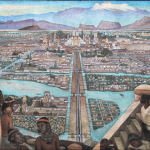
(Wikimedia Commons public domain photograph)
Of course, there was always the danger that an irresponsible, ignorant, or incompetent judge might misapply a Qur’anic rule or see an analogy where in fact none existed. So a new principle, “consensus” (ijma‘), came into play. This principle represented an effective insurance against the whims and odd ideas of isolated individuals. But when we talk about the “consensus” of the community, we are not talking about a democratic process in which peasants and shopkeepers carried an equal vote with the learned. Only certain opinions were allowed to carry weight regarding matters of technical law. In practice, the ‘ulama’ came to represent the entire Muslim community, and “consensus” eventually came to mean the agreement of the scholars. Someone even discovered a convenient hadith report that gave strong support to this principle of “consensus” and in fact raised it to the level of practical infallibility: “My community will never agree on error,” the Prophet was quoted as saying.
More needs to be said on this notion of the infallibility of the scholarly consensus, since it is one of the strengths of Islam. It is hard for many in the West to understand Islam because it does not appear to function in ways familiar to us. There is, for instance, no Islamic “church” or “priesthood.” There is no pope or president who stands clearly at the head of the entire Islamic community. There is, simply, a vast number of ‘ulama’, men who have received the same training and read the same books, who think in the same way, and whose consensus on most matters is remarkably uniform from Morocco to the former Soviet Central Asia and from Nigeria to Indonesia. We sometimes wonder how a certain Muslim thinker gains authority within the community and is able to make his opinions count more than the opinions of others. It is certainly not because he holds a certain office. There are no living prophets or apostles, and certainly no popes and cardinals, in Islam. There is not even an authoritative committee on doctrine or theology or practice that all Muslims are obliged to accept. The situation is actually much like that in rabbinic Judaism. Certain rabbis or scholars, men like Hillel and Akiva and Maimonides, have carried authority down through the years not because of their offices, but because of their insights and their brilliance and the force of their personalities. Recognition has simply grown up among generations of Jews that this particular rabbi X, rather than those others who lived at the same time, is an authority worth taking into account. Very much the same process occurs in Islam.
I say that this formlessness, this diffuseness of authority, this absence of a tightly organized “church,” has been a strength for Islam. Why? Because the consensus of the ulama is, in many ways, comparable to a mighty river. It is very difficult to turn and almost impossible to dam. No one man, and probably no group of men, can hijack Islam as a whole and easily turn it to private purposes or reformulate it according to private whims. On the other hand, this striking uniformity and diffuseness of the Islamic community makes it very hard for anyone to reform or change Islam. In the Church of Jesus Christ of Latter-day Saints, a revelation to the president can change a policy overnight that has been in place since at or near the beginnings of the Restoration. (The 1978 revelation regarding priesthood is a case in point. Men of African ancestry began to be ordained within the week.) The pope has a somewhat similar power within the Roman Catholic faith. But no such person or institution exists in Islam. And, since the source of the authority held by the ‘ulama’ is their knowledge of the past, it is the past that tends to control Islam. To lightly cast it off is to give up the source of authority, the link to God that Muslims believe they have in the life and teachings of Muhammad.
Islamic law is seen not as a product of human intelligence, nor as something that can be adapted to changing social needs and ideals. Rather, it is direct from God. In theory, it is immutable. As I have pointed out, there have been various ways in which Muslim jurists have been able to adapt the shariah to changing circumstances. But there is no doubt that this adaptation is quite difficult and can only operate under considerable restriction. Westerners sometimes accuse conservative Muslims of wanting to “turn the clock back.” The charge is often actually true, and many Muslims would cheerfully admit it. They are in fact attempting to go back to the pristine Islam of the seventh century. For Sunnis, it is a return to the days of the “rightly guided caliphs”—Abu Bakr, ‘Umar, ‘Uthman, and ‘Ali—that is wanted. (For the Shi‘ites, it is only ‘Ali who counts.)
There was another potential source of rulings within Islamic law. That principle is known as ijtihad, and means something like “independent reasoning” or “private judgment.” (The word ijtihad comes from an Arabic three-consonant root, jhd, with the basic sense of “striving.” It is closely related to the word jihad, which, as we have seen, is often rendered in English as “holy war.”) Of course, it wasn’t just anybody whose “private judgment” could be validly applied to legal matters. It had to be someone thoroughly versed in the Qur’an, in the body of hadith traditions, and in legal precedent. Qualified judges were to use their own independent reasoning when no clear rule could be found in either the Qur’an or the hadith and when a clear consensus on the question did not exist among their colleagues. Obviously, this allowed for a certain amount of freedom on the part of early Muslim judges. But, gradually, as ijma‘ was reached on more and more issues, the “door of ijtihad” (as Islamic writers call it) was closed.
Today, that door seems firmly shut. Thus, the sources of Islamic shariah law are, beginning at the most authoritative: (1) the Qur’an, (2) accepted hadith reports, (3) reasoning by analogy (qiyas), (4) consensus (ijma‘), and (5) personal judicial judgment (ijtihad). However, since it is the consensus of the learned community that infallibly separates valid interpretations of the Qur’an and sunna from invalid ones, and that distinguishes analogies that work from those that do not, ijma‘ assumes, in practice, a dominant role in the elaboration of Islamic law.












